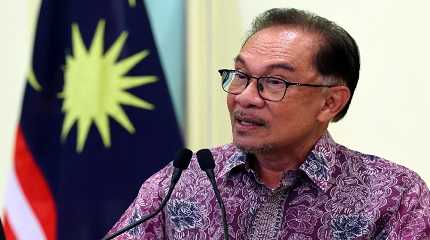
JAKARTA, Nov 24 (NNN-Bernama) — An Indonesian analyst is impressed by the dynamic leadership of 76-year-old Anwar Ibrahim, driving a dramatic transformation in the country through Malaysia Madani.
N. Syamsuddin Ch. Haesy analyses how Anwar, as the 10th Prime Minister, took bold steps in the first year, building trust and gaining support from all stakeholders.
Anwar achieved this through active communication, unambiguous working mechanisms, and team empowerment, according to Syamsuddin’s article, ‘Anwar Ibrahim’s First Year Expanding the Civilisational Vision of Malaysia,’ on AkarpadiNews.com.
These elements played a crucial role in the rapid success of Anwar’s early governance, writes Syamsuddin, a political and cultural observer, who is also the secretary-general of the Malaysia-Indonesia Journalists’ Brotherhood Association (ISWAMI) Indonesia.
The announcement of Malaysia Madani 80 days after taking office reminded Syamsuddin of events in Jakarta, where Anwar was the first to translate ‘civil society’ as ‘masyarakat madani’ in 1995.
‘Masyarakat madani’ refers to a modern, democratic, and inclusive society where the country’s religious and cultural values evolve alongside advancements in science, technology, creativity, innovation, and the ecosystem.
Malaysia Madani
Syamsuddin sees Malaysia Madani as an advanced country promoting global unity, equality, prosperity, humanitarian governance, and a shift towards serving the people rather than political power, with democracy aimed at national harmony.
It represents a national policy that goes beyond economic development based on ‘humanity’ – a form of governance that meets the demands of justice based on values that encourage sympathy, empathy, respect, mutual respect, and love for fellow humans.
It also reflects manners and language etiquette, including ethical practices in politics, economy, society, and cultural civilisation.
“Advancing Malaysia Madani requires a rapid shift in national thinking from narrow nationalism to global nationalism and hard work through synergy among all elements of the country, building trust between the government and the people, and implementing effective governance policies,” he explained.
Embracing strategic growth and responsive governance
He also stated that Anwar strategically laid the foundation for sustainable growth and planning for sustainable excellence, as demonstrated in the 2024 Budget.
Anwar responded firmly to opposition criticism in the Parliament, addressing government initiatives, and improving governance and development programmes.
Internally, he prioritised building an efficient and strong team in his government, focusing on talent management and improving human resource governance.
Despite facing political challenges, he remains optimistic about realising the vision of Malaysia Madani and encouraging collective participation in shaping a new national vision.
“Anwar shifted from ‘programme-centric’ to ‘people-centric’ and clearly understands the needs of the people, addressing opposition concerns and aligning government policies,” added Syamsuddin.
Complex global challenges
In his one-year tenure, Syamsuddin stated that Anwar not only faced domestic political challenges due to the forming of the Unity Government, a coalition between the Pakatan Harapan and UMNO-Barisan Nasional.
Anwar faces the challenges of the times amid rapid changes from the era of the script/letters to the digital era: the era of Artificial Intelligence and the Internet of Things, or Society 5.0.
He also had to navigate global political and economic dynamics in the post-Covid-19 era, including world political instability, due to the Ukraine-Russia war and the Israel-Hamas conflict, triggering crimes against humanity.
Anwar also needs to navigate the shift in geopolitical and geo-economic orientation from America-Europe to Asia-Pacific, as well as China’s manoeuvres in the Asian region, significantly influencing Southeast Asia, according to Syamsuddin.




